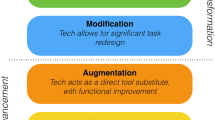Abstract
One of the requirements of the New Zealand Curriculum Framework (Ministry of Education, 1993a) is that all curricula developed in New Zealand must be gender inclusive. Developers of the recently released science curriculum, and the draft technology curriculum, have responded to this requirement in different ways. In this paper I discuss a theorisation of the term ‘gender inclusive’ within national curriculum development generally, and explore and analyse these different responses within the specific context of the science and technology curriculum developments. Particular emphasis is placed on the historical difference between science education and technology education in New Zealand schools, and on the impact theoretical discourses have on the way in which terms such as ‘gender inclusive curricula’ are conceptualised, and viewed as appropriate, or not, for specific purposes.
Similar content being viewed by others
References
Atkins, E. (1988). Reframing curriculum theory in terms of interpretation and practical: A hermeneutical approach.Journal of Curriculum Studies, 20(5), 437–448.
Baker, R. & Leahy, H. (1992, May) Beyond access: Curriculum development and the position of girls.Delta, 46, 41–45, Journal of the Education Department, Massey University, Palmerston North, New Zealand.
Cherryholmes, C.H. (1987) A Social Project for Curriculum: post-structural perspectives.Journal of Curriculum Studies, 19(4), 295–316.
Densem, P. & Leahy, H. (1992).Gender and education policy in Aotearoa/New Zealand. Paper presented at the 1992 AARE/NZARE Joint Conference, Deakin University, Geelong, Australia.
Ferguson, K.E. (1991).The man question in feminist theory: Visions of subjectivity. Berkeley CA: University of California Press.
Gilbert, J. (1994a). The construction, reconstruction and deconstruction of statements on gender equity in two science curriculum documents: Work in progress. In J. Gilbert (ed.),Feminism/Science Education: A Research Symposium on Feminist Perspectives in Science Education. Hamilton, NZ: Centre for Science and Mathematics Education Research, University Of Waikato.
Gilbert, J. (1994b). Introduction. In J. Gilbert (ed.)Feminism/Science Education: A Research Symposium on Feminist Perspectives in Science Education. Hamilton, NZ: Centre for Science and Mathematics Education Research, University Of Waikato.
Giroux, H. A. (1990).Curriculum discourse as postmodern critical practice. Geelong: Deakin University Press.
Grosz, E. (1990). A note on essentialism and difference. In S. Gunew, (ed.)Feminist knowledge: critique and construct. London: Routledge.
Harding, S. (1986).The science question in feminism. London: Cornell University Press.
Larner, W. (1993). Changing contexts: Globilization, migration and feminism in New Zealand. In S. Gunew & A. Yeatman (eds.)Feminism and the politics of difference. Wellington: Bridget Williams Books Limited.
Lather, P. (1991).Getting smart: Feminist research and pedagogy with/in the postmodern. New York: Routledge.
Lemert, C. (1992). General social theory, irony, postmodernism. In S. Seidman & D.G. Wagner (eds.)Postmodernism and social theory: The debate over general theory. Cambridge: Blackwell.
Ministry of Education, (1993a).New Zealand Curriculum Framework. Wellington: Learning Media.
Ministry of Education, (1993b).Science in the New Zealand Curriculum. Wellington: Learning Media.
Ministry of Education, (1993c).Technology in the New Zealand Curriculum. Wellington: Learning Media.
Ohlssen, M. (1991). Producing the truth about people: Science and the cult of the individual in educational psychology. In J. Morss & T. Linzey (eds).Growing up: The politics of human learning. Auckland: Longman Paul.
Piussi, A. M. (1990). Towards a pedagogy of sexual difference: Education and female genealogy.Gender and Education, 2(1), 81–90.
Suggett, D. (1990). Inclusive curriculum: A gain or loss for girls? In L. Yates (ed.)Thoory/practice dilemmas: Gender, knowledge and education. Geelong: Deakin University Press.
Yates, L. (1990).Theory/practice dilemmas: Gender, knowledge and education. Geelong: Deakin University Press.
Yates, L. (1993).The Education of girls: Policy, research and the question of gender. Australian Education Review No. 35. Canberra: The Australian Council for Educational Research Ltd.
Author information
Authors and Affiliations
Additional information
Specializations: feminist theory, science education, technology education, technology curriculum development.
Rights and permissions
About this article
Cite this article
Mather, V. Gender inclusive Curricula: A focus on two responses. Research in Science Education 24, 226–235 (1994). https://doi.org/10.1007/BF02356348
Issue Date:
DOI: https://doi.org/10.1007/BF02356348




